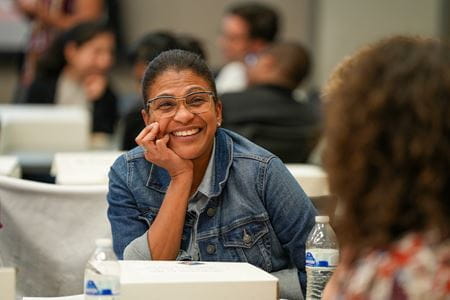You’re staying with friends in a vacation home in the Australian outback when, suddenly, you see smoke—a bushfire is headed your way! What are the most important items for your survival? Your phone, a car, a garden hose, a wool blanket?
This was the scenario posed to members of the 20th class of the Leadership in Academic Medicine Program (LAMP) at Indiana University School of Medicine during their inaugural session on September 21. As this cohort of 58 early-career faculty members worked in groups to determine the best path toward survival, they tested their communication, team-building and problem-solving skills during the simulation led by Mary Dankoski, PhD, executive associate dean for faculty affairs and professional development.
The result? Let’s just say many of them wouldn’t survive an Aussie bushfire. But they did learn a lot about team dynamics—lessons like making sure all voices are heard, not just the loudest one. That’s how you end up fighting a bushfire with a garden hose.
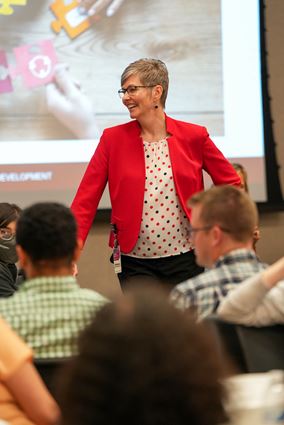 For 20 years, LAMP has been training leaders at IU School of Medicine, starting as an initiative of Steve Bogdewic, PhD, the school’s first dean for faculty affairs and professional development. Since then, 707 faculty have been through the program, which is designed to assist early-career faculty in career planning and help them become effective leaders in academic medicine.
For 20 years, LAMP has been training leaders at IU School of Medicine, starting as an initiative of Steve Bogdewic, PhD, the school’s first dean for faculty affairs and professional development. Since then, 707 faculty have been through the program, which is designed to assist early-career faculty in career planning and help them become effective leaders in academic medicine.
Today, many of those LAMP graduates fill leadership roles across departments and divisions at IU School of Medicine.
“The LAMP program was extremely helpful in understanding different workings of academic medicine, as it provided structure to things like promotion and tenure, negotiating contracts, career development, and creating a meaningful CV and personal statement,” said Sara Kane, DO, MSEd, assistant professor of clinical pediatrics and a 2020 LAMP graduate. “I also made connections for mentors and collaborators through LAMP whom I continue to work with today.”
Kane’s current leadership roles include Pediatric Residency Program director, co-director of the Clinician Educator Training Pathway and director of education for the Division of Neonatal-Perinatal Medicine. She has collaborated on projects and presentations with LAMP co-director Laura Torbeck, PhD, and she considers LAMP’s other co-director, Gabriel Bosslet, MD, to be a career mentor.
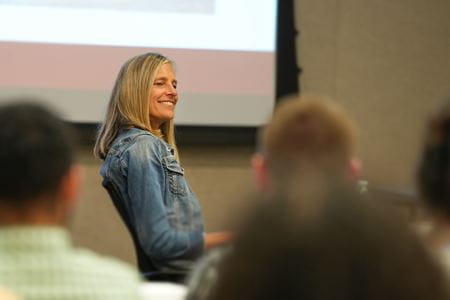 Torbeck and Bosslet, both assistant deans for faculty affairs and professional development, are themselves LAMP alumni.
Torbeck and Bosslet, both assistant deans for faculty affairs and professional development, are themselves LAMP alumni.
“We get a lot of informal feedback that the program is quite formative,” Bosslet said. “I think many people actually discover years later that it was beneficial in ways they can’t comprehend while junior faculty.”
Although many of LAMP’s benefits are hard to quantify, there is hard data to back up the program’s claims to success. Amy Ribera, PhD, director of research and evaluation for faculty affairs and professional development, recently led a study comparing full-time faculty hired between 2003 and 2017 who participated in LAMP to those who did not. The results were remarkable.
Compared to non-participants, early-career faculty who participated in LAMP were:
- 60% more likely to get a promotion
- 31% less likely to leave the institution
- 2 times more likely to attain a leadership position
“These are our goals, so it is nice to see these outcomes are obtained,” Bosslet said.
Making connections
LAMP’s 20th cohort is a diverse group. Tables are sprinkled with MDs and PhDs holding various research and clinical interests. All have been nominated by their department or division heads and identified as potential future leaders for the school of medicine.
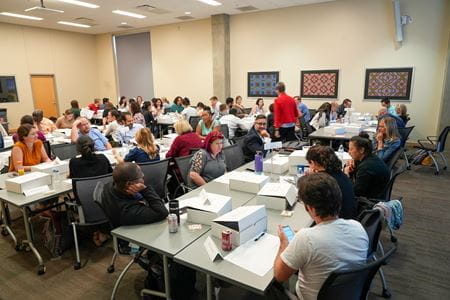 “The program covers leadership principles and topics that will help them grow in their careers, including the setup for promotion and tenure and time management skills,” Torbeck said. “But another goal is to help them develop a network. These are faculty from all departments, and they sit at a table with people they don’t know. After nine months of fellowship, we hope they have gained a sense of collegiality with these peers.”
“The program covers leadership principles and topics that will help them grow in their careers, including the setup for promotion and tenure and time management skills,” Torbeck said. “But another goal is to help them develop a network. These are faculty from all departments, and they sit at a table with people they don’t know. After nine months of fellowship, we hope they have gained a sense of collegiality with these peers.”
Juan Carlos Venis, MD, MPH, is a 2020 LAMP graduate who maintains both professional and social connections with some from his cohort. He credits the program with helping him learn to manage his bandwidth and work-life balance.
“As new faculty, it can become easy to think you have to constantly say ‘yes,’” said Venis, assistant professor of clinical family medicine. “You may get a lot of different advice and feel like you’re lacking direction, institutional knowledge and capital to move your ideas forward. LAMP supported and pushed me to identify my goals for professional development. It helped me identify my supports and seek mentorship. This can also help new faculty be intentional in how they are managing their time and effort to really achieve their goals.”
Francesca Duncan, MD, joined the IU School of Medicine faculty as assistant professor of clinical medicine in July 2021. LAMP’s book club selections helped her gain valuable insights about becoming a better leader. Shortly after completing the program in 2022, Duncan stepped into leadership as her department’s co-chair for equity, diversity and inclusion.
“I’m an early-career faculty member here and just getting started at IU, so I was cautious about applying for that position,” Duncan said. “LAMP leaders encouraged me to pursue it, and it has opened up so many more doors. Now I am able to meet regularly with other leaders in the Department of Medicine.”
LAMP’s 20th cohort
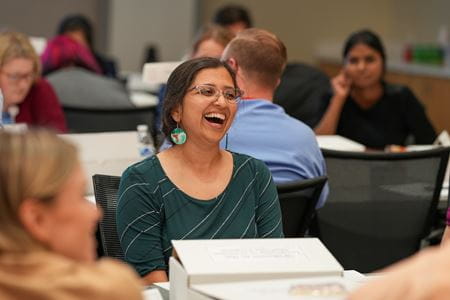 Over the years, 52% of LAMP participants have been female, and 8% come from backgrounds underrepresented in medicine. The 20th cohort includes similar demographics.
Over the years, 52% of LAMP participants have been female, and 8% come from backgrounds underrepresented in medicine. The 20th cohort includes similar demographics.
Tables are a mix of physicians and scientists, male and female, from different departments and with educational backgrounds from institutions around the nation and world.
Christopher Njeh, PhD, associate professor of radiation oncology, joined the faculty at IU School of Medicine in 2021. He’s not new to academic medicine—he brings experience from faculty positions in radiology and therapeutic medical physics at several other institutions and was chief medical physicist and radiation safety officer at Franciscan Health prior to joining IU—but Njeh is new to managing a team. Now as director of the Division of Medical Physics and its residency program, he is seeking to develop those skills.
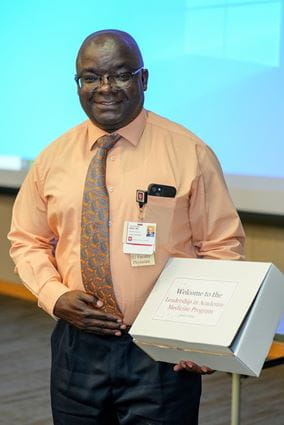 “I have a diverse group of people to manage, so this training will be valuable,” Njeh said.
“I have a diverse group of people to manage, so this training will be valuable,” Njeh said.
Stefanie Rodenbeck, MD, is a native Hoosier who went to Georgetown University to get her MD before returning to Indiana for residency training. She’s now an assistant professor of clinical neurology at IU School of Medicine and is eager to help improve neurology care and physician education in her home state.
“LAMP is a unique way to guide medical professionals in their development,” she said.
New to this year’s LAMP agenda, participants will be placed into scholarship accountability groups to help them advance a piece of scholarship during the academic year, Bosslet said.
He and Torbeck have been leading the program since 2017, and Bosslet says he remains passionate about faculty development “because faculty are the most important resource of any teaching institution, because making faculty better at their jobs makes teaching easier and more fun, and because helping faculty learn efficiencies of work means they can spend more time at home with their family.”
Reading for Leading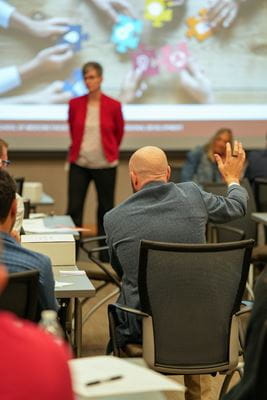
Want to grow your leadership skills? Check out these titles on the LAMP Book Club reading list for 2023-24.
- “Deep Work: Rules for Focused Success in a Distracted World” by Cal Newport
- “The Power of Moments” by Dan Heath and Chip Heath
- “Crucial Conversations: Tools for Talking When Stakes Are High” by Grenny, McMillan, Switzler and Patterson
- “Multipliers: How the Best Leaders Make Everyone Smarter” by Liz Wiseman and Greg McKeown
- “The Practice of Groundedness” by Brad Stulberg
